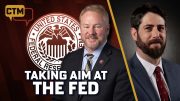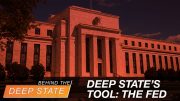Facing its best chance of passage ever under the new GOP-controlled Congress and the incoming Trump administration, wildly popular legislation to open up the Federal Reserve’s books, known as “Audit the Fed,” was just re-introduced in the 115th Congress. The bill, sponsored by dozens of lawmakers in the House and the Senate the day it was re-introduced, would force the obsessively secretive and increasingly controversial central bank to submit to a full government audit. But the Fed and its apologists do not plan to allow a real audit without a tough fight.
The legislation, first introduced many years ago by constitutional champion and former congressman Ron Paul (R-Texas), aims to stop the Federal Reserve from concealing vital information about its operations from Congress, lawmakers said. If and when the “Federal Reserve Transparency Act” becomes law, the four-page bill would require a full audit of the Fed’s Board of Governors and the privately owned regional Fed banks by the Comptroller General of the United States. In the Senate, the bill is known as S. 16, while in the House it goes by H.R. 24.
“No institution holds more power over the future of the American economy and the value of our savings than the Federal Reserve, yet Fed Chair Yellen refuses to be fully accountable to the people’s representatives,” declared liberty-oriented Senator Rand Paul (R-Ky.; shown on left), the lead sponsor in the U.S. Senate and the son of Fed foe Ron Paul. “The U.S. House has responded to the American people by passing Audit the Fed multiple times, and President-elect Trump has stated his support for an audit. Let’s send him the bill this Congress.”
Indeed, the legislation has passed the U.S. House of Representatives repeatedly, with overwhelming bipartisan support. In the last Congress, for example, the bill was approved in a massive landslide, with 333 lawmakers voting in favor and just 92 against. Virtually every Republican and more than half of all Democrats supported the bill. The bill also had majority support in the Senate — including the backing of every Republican except establishment tool Senator Bob Corker (R-Tenn.) — but was blocked by Fed apologists and establishment operatives.
The measure’s strong support in Congress, despite a fierce lobbying and propaganda campaign launched by the central bank and the establishment behind it, may have something to do with its incredible popularity with the American people. Polls show that the legislation is supported by an overwhelming super-majority of Americans, with some three fourths supporting Fed transparency and just one in ten opposing it.
President-elect Donald Trump has also been a vocal supporter of auditing the Fed and even reining it in more broadly. On the campaign trail, Trump blasted the central bank’s politically motivated manipulation of the U.S. economy and its artificially low interest rates. He also denounced the “very false economy” propped up by Fed monetary gimmicks. And, in a swipe at one of his opponents in the GOP primary, he touted transparency. “It is so important to audit The Federal Reserve,” Trump said, echoing comments made by his advisers and associates.
Failed Democrat nominee Hillary Clinton, a longtime establishment operative, hit back at Trump immediately, saying he should not malign or even comment on the increasingly unpopular institution that controls America’s monetary system. But Trump was not deterred. In fact, the president-elect and his vice president have both praised the gold standard — an honest monetary system that would obliterate the banking cartel’s stranglehold on the U.S. economy. And so, there is little doubt among analysts that President Trump would happily sign the “Audit the Fed” bill if and when it reaches his desk.
In the House, where support for the legislation is enormous, lawmakers also celebrated the bill. “The American public deserves more insight into the practices of the Federal Reserve,” said lead sponsor Representative Thomas Massie (R-Ky.; shown above), a leading constitutionalist in Congress. “Behind closed doors, the Fed crafts monetary policy that will continue to devalue our currency, slow economic growth, and make life harder for the poor and middle class. It is time to force the Federal Reserve to operate by the same standards of transparency and accountability to the taxpayers that we should demand of all government agencies.”
Former Congressman and GOP presidential candidate Ron Paul, who wrote the original Audit the Fed bill and made it mainstream, applauded his son Rand and his friend Massie for their efforts. “For 105 years, the Federal Reserve has exercised almost absolute and unquestioned authority over America’s monetary policy,” said Paul, who has long advocated abolishing the controversial central bank altogether. “The result has been a boom-and-bust business cycle, growth in government, increasing income inequality, and a loss of over 90 percent of the dollar’s purchasing power. No wonder almost 80 percent of Americans support Audit the Fed!”
Paul, who vowed to rally his supporters at Campaign for Liberty behind the bill, also said he thought Trump was onboard. “While campaigning for President, Donald Trump not only criticized the Fed’s easy money policies, he also endorsed Audit the Fed,” the former lawmaker said. “With a President who supports Audit the Fed finally sitting in the White House, Congress has no excuse to not quickly pass this bill and finally let the American people know the truth about the Fed’s conduct on monetary policy, including its dealings with foreign governments and central banks.”
Among other provisions, the legislation would require the nonpartisan, independent Government Accountability Office (GAO) to “conduct a thorough audit of the Federal Reserve’s Board of Governors and reserve banks within one year of the bill’s passage.” The GAO would then report back to the American people’s representatives within 90 days of the audit being completed — for the first time in U.S. history.
Among the Fed schemes and operations that would be audited are transactions with foreign central banks and governments — many of which have received multi-billion dollar bailouts. Also subject to transparency would be “deliberations, decisions, or actions on monetary policy matters.” Transactions made under the direction of the powerful Federal Open Market Committee (FOMC) would also be subject to sunshine, as would discussions and communications between Fed employees, officers, and board members related to the relevant activities.
Perhaps anticipating the oncoming onslaught in favor of transparency, Philadelphia Federal Reserve Bank President Patrick Harker, who runs the privately owned regional Fed bank, defended the controversial institution and its alleged decentralization. Speaking to an audience at Philadelphia’s famous Athenaeum library shortly before the New Year, the regional Fed boss even claimed, falsely, that the central bank is already “altogether transparent.”
“Recent calls to audit the Fed are actually about assessing our policy decisions,” fumed the central banker, as if the American people and their elected representatives had no right to “assess” the immensely influential “policy decisions” of their ostensible public servants. To understand just how detached from reality and the American people the Fed has become, imagine the head of any government agency or even private sector institution speaking out against transparency because the audit was “actually about assessing our policy decisions.”
Legislation to Audit the Fed would threaten also “the critical independence that Congress mandated” when it established the controversial institution in 1913, perhaps encouraging “hasty decisions to please political ends,” complained Harker, echoing Fed boss Yellen. Of course, in reality, the Federal Reserve Act was not even drafted by Congress. Instead, it was written largely by mega-bankers meeting secretly on Jekyll Island, as documented in the enormously influential book The Creature From Jekyll Island. And the mega-bankers’ agenda was hardly altruistic: They designed a federally backed banking cartel to hijack the economy and secretly enrich themselves at public expense.
Unfortunately for the American people and the Constitution, using shady tactics and incredible deceit, the mega-bankers succeeded. For over 100 years since, the banking cartel has had a monopoly on U.S. currency and massive, unconstitutional powers to centrally plan the economy and loot the public. Consider that during the most recent crisis, the Fed literally conjured trillions of dollars — with a T — into existence to shower on cronies, mega-banks, foreign central banks, Big Business, and other friends of the establishment. All of it was perpetrated behind closed doors at the expense of everyday Americans.
The Fed transparency bill already has eight co-sponsors in the U.S. Senate, and more are expected in the coming days and weeks. In the House, Audit the Fed had 41 co-sponsors as of January 3, the day it was introduced, with more expected soon. And already, organizations and activists from across the political spectrum are rallying supporters to ensure that the 115th Congress makes history by passing into law the first real audit of the shadowy central bank.
The Fed will fight back hard. Lobbyists will be deployed. And the establishment will do everything possible to protect its prized scam. But considering the make-up of Congress, the overwhelming public support, and the president-elect’s anti-Fed comments, the American people have the best opportunity ever to crack open the central bank’s dangerous secrecy. And then, once the public understands the enormity of the abuse that has been perpetrated against them by the Fed, the work of restoring an honest, sound, and constitutional monetary system for America can begin.
Photos at top: Sen. Rand Paul (left) and Rep. Thomas Massie
Alex Newman is a correspondent for The New American, covering economics, education, politics, and more. He can be reached at [email protected]. Follow him on Twitter @ALEXNEWMAN_JOU.
Related articles:
Blasting “False Economy,” Trump Takes on the Federal Reserve
By Exposing the Federal Reserve, Trump Does America a Huge Favor
Senate Blocks “Audit the Fed,” Preserving Central Bank Secrecy
Trump: Gold Better Than Cash; Puts His Money Where His Mouth Is
Central Banks Now Dominate Stock Market, Study Finds
Vast Majority Want to Audit the Federal Reserve, Poll Shows
Fed Manipulations in the Crosshairs
Central Bankers Prepare to Flood the World with More Funny Money
World Bank Insider Blows Whistle on Corruption, Federal Reserve
Fed Audit: Trillions For Foreign Banks, Conflicts of Interest
The Federal Reserve: Bankers for the New World Order
Fed Wages PR Battle for Power, Secrecy
Congress Debates the Federal Reserve: Reform or Abolish?
U.S. Fed Bailout of Euro Prompts New Push for Audit & Sound Money




